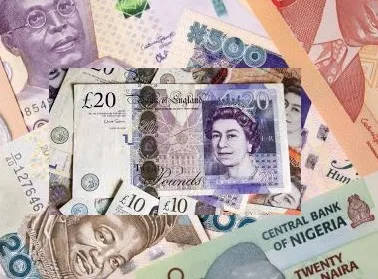The Nigerian naira has sustained its position at the upper end of its range against the British pound sterling, slightly declining as traders brace for the Bank of England’s interest rate decision today. The expectation among traders is that the British apex bank will likely maintain rates but may issue a dovish statement, considering the current economic indicators.
The pound has experienced a 1.5% decline against the US dollar this year, attributed to a relaxed outlook prompted by declining UK inflation and lackluster economic data. Investors foresee the Bank of England adopting a more accommodative stance on rates compared to the Federal Reserve, reflecting in market sentiments ahead of the bank’s announcement on Thursday.
Amidst this backdrop, the naira has faced continued depreciation against major currencies in both the official and parallel markets. Factors such as intensified speculation, hoarding, and delays in foreign exchange disbursement to Bureau De Change (BDC) operators have contributed to this trend.
On the black market, the British pound sterling traded at N1,752 against the naira, despite improved conditions in the official market. BDC operators have voiced concerns over delays in the Central Bank of Nigeria’s (CBN) disbursement process, which requires several weeks before dollars reach them. Some operators have reportedly opted out of the CBN’s dollar sales program due to these challenges.
Although the naira has depreciated from its peak of N2414 against the British pound in February, it has regained almost N250 since then, reflecting some resilience amidst currency fluctuations.
As anticipation builds for the Bank of England’s decision, expectations lean towards a maintenance of rates at 5.25 percent, with a dovish guidance. Market projections suggest a high likelihood of the bank holding its benchmark interest rate, with investors closely watching for hints on the timing of the first interest rate hike amidst moderation in the UK’s headline inflation rate.
The European Central Bank’s signaling of lower borrowing costs in June has also influenced market sentiments, with expectations of a potential rate cut in August by the Bank of England. The UK currency experienced a slight decline against the euro, hovering near a two-week low.
Prime Minister Rishi Sunak’s political aspirations could be impacted by these developments, as interest rate reductions ahead of anticipated elections may influence public sentiment amidst economic recovery assurances.
As the Bank of England’s decision looms, market participants remain vigilant for any cues that could shape currency dynamics in the coming months.










